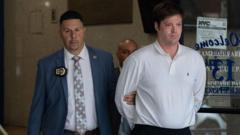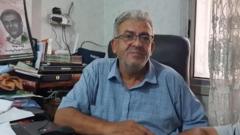Khalid Sheikh Mohammed, accused of masterminding the 9/11 attacks, was set to plead guilty, but the U.S. government has intervened, citing legal complexities and potential public harm. As pre-trial proceedings drag on at Guantanamo Bay, victims' families remain divided over the implications of these legal maneuvers.
Legal Tug-of-War: The Future of 9/11 Mastermind’s Guilty Plea Hangs in Balance

Legal Tug-of-War: The Future of 9/11 Mastermind’s Guilty Plea Hangs in Balance
The U.S. government's attempt to block Khalid Sheikh Mohammed's plea deal raises critical questions about justice for 9/11 victims.
Khalid Sheikh Mohammed, the alleged mastermind behind the September 11 terror attacks, has shifted his stance on pleading guilty after the U.S. government intervened to halt a plea deal last year. The military court proceedings at Guantanamo Bay were scheduled for his admission of guilt, but a recent ruling from a federal appeals court effectively postponed the session, prompting further legal scrutiny into the implications of the plea agreement.
Mohammed has been detained at Guantanamo for nearly two decades and faces charges linked to the attacks that claimed nearly 3,000 lives. Observers note that this case has encountered numerous complications, largely due to the extensive pre-trial hearings and the issue of torture that he allegedly endured while in U.S. custody. The severity of the charges includes conspiracy and murder, with the possibility of a death penalty trial looming over the negotiation process.
The hastily organized federal appeals court ruling aimed to provide time for consideration of the government's concerns regarding the plea deals. It did not make any definitive ruling on their validity but allowed for an expedited briefing process to evaluate the issues at hand.
At the heart of this legal controversy is not just the fate of Mohammed but the wider implications for the families of the victims of 9/11. Many relatives have expressed frustration and disappointment over the government's actions, fearing that attempts to block a plea would prolong the agony of a trial that has already spanned over two decades. Some families argue the plea deals could lead to a long-awaited resolution while ensuring public accountability.
The U.S. Department of Defense has expressed conflicting views concerning the plea agreements. Secretary Lloyd Austin had previously endorsed the deal but later sought to rescind it, indicative of the high-profile tensions surrounding the prosecution. This has sparked criticism from various parties, including senators and victims' families, who accuse the administration of undermining justice.
As the legal battle unfolds, the way forward remains uncertain, with the possibility of further delays looming. The Guantanamo prison, having housed many terror suspects since its inception in the early 2000s, will continue to be the stage for this complex legal narrative that has significant implications for U.S. justice and the families still grappling with the aftermath of the 9/11 tragedy.





















